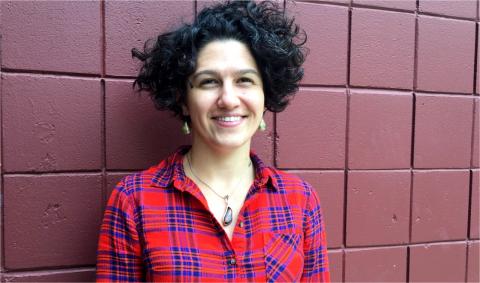
UROC grad students use research to solve real-life problems

Since the Robert J. Jones Urban Research and Outreach-Engagement Center (UROC) opened its doors in 2010, faculty and staff have been on a mission to create public partnerships and collaborate with the community in ways that produce meaningful research to solve real-life problems. Graduate students play an integral role in much of that research, making invaluable contributions to projects while gaining experience that can’t be had in the classroom.
Katie Fritz Fogel, who earned a master’s degree in public health from the University of Minnesota’s Humphrey School of Public Affairs in May 2015, has worked on several research projects at UROC. Most recently, she has been collaborating with Lauren Martin, UROC’s director of research, on studies related to the center’s ongoing Sex Trading, Trafficking and Community Well-Being Initiative.
The goal of the academic-driven initiative is to work with the community to better understand the growing problem of sex trafficking and prostitution in North Minneapolis and other urban areas, and help come up with steps and strategies for stopping it. With Martin overseeing the project, Fogel worked with YouthLink, a North Minneapolis-based non-profit for homeless youth, to identify ways to better prevent sexual exploitation of the young people they serve. “Working with committed and smart graduate students like Katie Fogel on this kind of project is a key part of advancing the mission of UROC,” Martin says. “We contributed to the important work of YouthLink while at the same time supporting the development of an exceptional engaged scholar.”
Fogel’s research included a series of interviews with YouthLink staff, as well as focus groups that included homeless female youth participating in the non-profit’s programs. While the young women were not asked to say whether they had been exploited, they were asked to talk about what the word exploitation means to them. The discussion produced a stark picture of the desperate street life that homeless young women, along with young men and LGBTQ youth, face every day. “Some of what they said was really intense and emotional, and you really got a sense of what the youth go through,” Fogel recalls, explaining that one of the main things that came out of the conversations is that the presence of sexual exploitation is ubiquitous among homeless youth in the Twin Cities.
The research also made clear that while youth are openly talking about their experiences with each other, more needs to be done to support staff who are trying to engage homeless youth in tough conversations. Also significant is the finding that youth are often unclear about what exploitation is and when it is happening to them and others. “These young people are always trying to figure out what they have to do just to have a place to sleep or something to eat, so what they will do to get those things becomes a question of degrees,” Fogel says.
For marginalized youth, Fogel explains how bartering that starts out with stealing something for someone or braiding hair in return for a meal, can quickly turn into requests to perform sexual acts. Things happen so fast, it’s hard to know when and where to draw the line, especially if you don’t recognize you are being exploited. “We as caring adults, social workers, youth workers, educators, police and others, need to understand how youth, including male and LGBTQ youth, think about and experience sexual exploitation,” she says. “That way, we can best recognize the situation and intervene and/or engage appropriately.”
Fogel says having the opportunity to take the lead on such an important and expansive project was a key part of her graduate school experience, and helped reinforce her belief that applied research can play a key role in helping communities solve problems. “I really liked being embedded with UROC because I had a real opportunity to try things out and learn while being supported the whole time by Lauren and others on staff,” she says. “This is what research should be.”